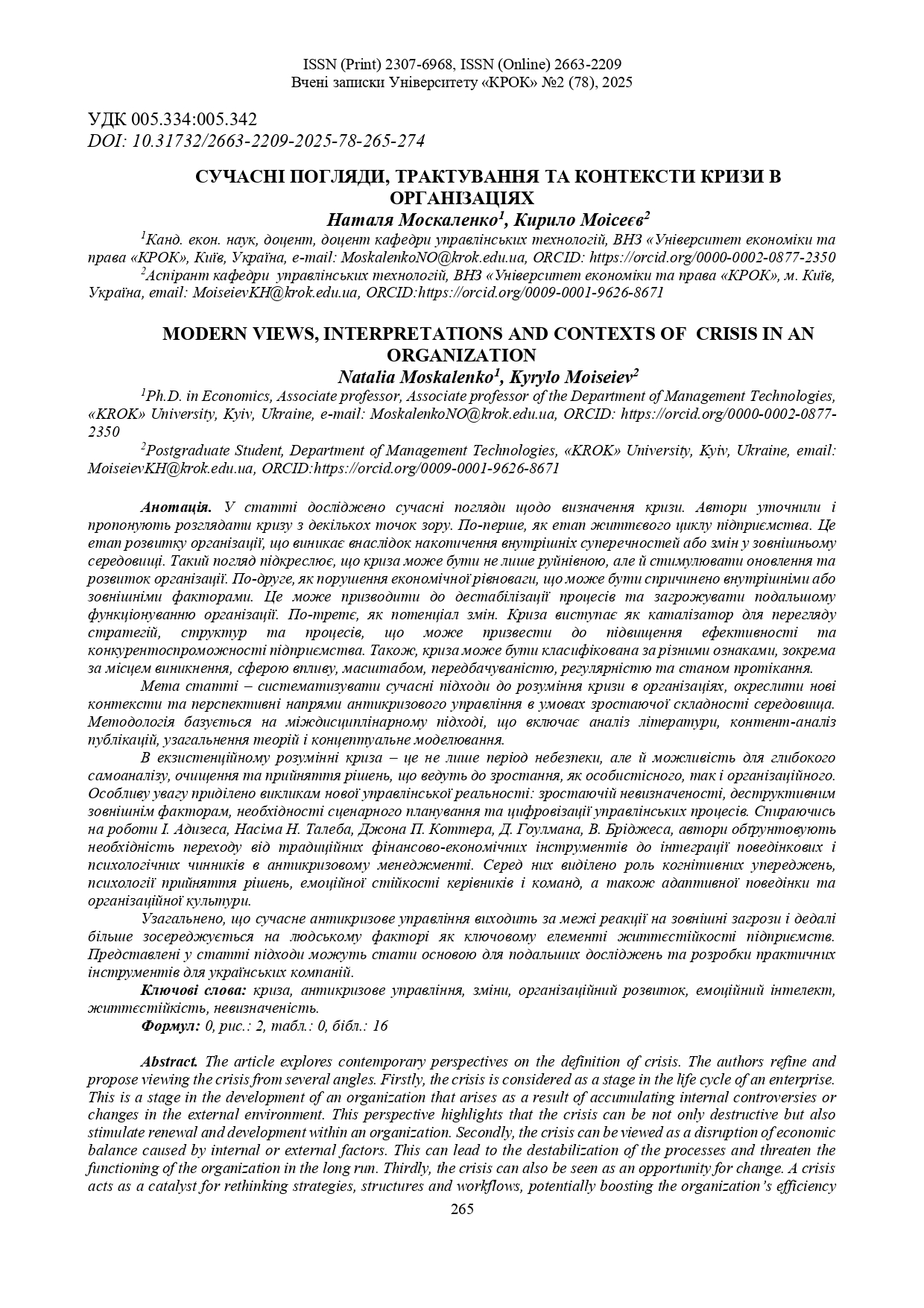MODERN VIEWS, INTERPRETATIONS AND CONTEXTS OF CRISIS IN AN ORGANIZATION
DOI:
https://doi.org/10.31732/2663-2209-2025-78-265-274Keywords:
crisis, crisis management, оrganizational changes, emotional stability, viability, insignificanceAbstract
This article explores the definition of crisis in the modern economic and management literature in the context of the full-scale invasion of Ukraine and the long state of war, which has actualized the need to reconsider the nature of crisis phenomena in activity of companies. The authors highlight the multi significance of the term "crisis" and analyze it through the prism of various scientific approaches — including its interpretation as a stage in the company’s life cycle, a disruption of economic balance and a potential for changes etcetera. Based on an analysis of the modern Ukrainian research, the article outlines key definitions and changes in scientific approaches.
Special attention is paid to the challenges of the new management reality: growing uncertainty, destructive external factors, necessity of the scenario planning and digitalization of management processes. The authors approve the necessity of transformation from traditional financial and economic tools to the integration of behavioral and psychological factors in anti-crisis management. The role of cognitive biases, the psychology of decision-making, the emotional stability of managers and teams, as well as adaptive behavior and organizational culture are highlighted among them.
It is summarized that modern crisis management goes out of the reaction to external threats and increasingly has been focusing on the human factor as a key element of the viability of enterprises. The approaches, presented in the article, can become the basis for further research and development of practical tools for Ukrainian companies in conditions of long-term crises.
Downloads
References
Шаранов Р. С. Алгоритм антикризового управління підприємства Центральноукраїнський науковий вісник. Економічні науки. 2021. Вип. 6 (39). С. 288-296. URL: https://economics.kntu.kr.ua/pdf/6(39)/30.pdf (дата звернення: 12.04.2025).
Халіна В. Ю., Абєленцєв Є. В. Теорія адаптації бізнесу до умов невизначеності. Економіка та суспільство. 2023. № 55. URL: https://doi.org/10.32782/2524-0072/2023-55-6 (дата звернення: 12.05.2025).
Чернишова Л. І., Бондар К. Р., Красіловська Л. О. Особливості управління ризиками в умовах дії воєнного стану: моделі поведінки сучасних підприємств. Науковий вісник Одеського національного економічного університету: зб. наук. праць; за ред.: В.В. Коваленко (голов. ред.). (ISSN 2409-9260). Одеса: Одеський національний економічний університет. 2024. № 3-4 (316-317). С. 126-136. DOI: https://doi.org/10.32680/2409-9260-2024-3-4-316-317-126-136 (дата звернення: 12.04.2025).
Кривобок К. В. Обґрунтування сучасного підходу щодо адаптації підприємства до нестійкого зовнішнього середовища. Економіка і суспільство. 2018. Вип. 14. С. 412-420. URL: https://economyandsociety.in.ua (дата звернення: 13.04.2025).
Якось І. С. Ризик як міра невизначеності. Економічний вісник Донбасу. 2009. № 1 (15). С. 136-139. URL: http://dspace.nbuv.gov.ua (дата звернення: 13.04.2025).
Яцишин С.Р. Групування та класифікація видів невизначеності функціонування підприємств в конкурентному середовищі. Соціально-економічні проблеми сучасності: Матеріали ІV Всеукраїнської науково-практичної інтернет-конференції [ м. Маріуполь, 31 травня 2020 р.]. Маріуполь, 2020. C. 52-56. URL: http://dspace.wunu.edu.ua/handle/316497/38414?mode=full (дата звернення: 13.04.2025).
ІВАНЧЕНКО, К., & БІЛОВОДСЬКА, О. (2024). КОНЦЕПТУАЛЬНІ ПІДХОДИ ДО ВИЗНАЧЕННЯ ТА КЛАСИФІКАЦІЇ КРИЗУ ДІЯЛЬНОСТІ СУБ’ЄКТІВ ГОСПОДАРЮВАННЯ. Вісник Київського національного університету імені Тараса Шевченка. Економіка, 1 (224), 28-36. https://doi.org/10.17721/1728-2667.2024/224-1/4 (дата звернення: 22.04.2025).
Больнов, Отто Фрідріх // Велика українська енциклопедія. URL: https://vue.gov.ua/Больнов, Отто Фрідріх (дата звернення: 26.04.2025).
Bollnow, O. F. (1966). Krise und neuer Anfang: Beiträge zur pädagogischen Anthropologie. Verlag W. Kohlhammer. Доступно за посиланням: bollnow-gesellschaft.de (дата звернення: 28.04.2025).
Adizes, I. K. (2020). How to Manage in Times of Crisis. Adizes Institute Publishing. Adizes Institute. "The PAEI Model Explained." URL: https://www.adizes.com/. (дата звернення: 26.04.2025).
Managing in Times of Crisis: Lessons from Adizes. Text by Mike Sainz (2024). URL: https://openexo.com/insight/managing-in-times-of-crisis-lessons-from-adizes?utm_source=chatgpt.com
Талеб, Насім Ніколас (2021). Антикрихкість. Про (не)вразливе у реальному житті. Наш Формат. 392 с. (дата звернення: 12.04.2025).
Crisis Leadership: The First Response Shapes The Journey (2021). By Jimmy Leppert and Rod Walker. URL: https://www.kotterinc.com/crisis-leadershiphow-the-first-response-shapes-the-journey/?utm_source=chatgpt.com (дата звернення: 26.04.2025).
Bridges, W. , Bridges. S. (2017). Managing Transitions: Making the Most of Change (Revised 4th Edition). Nicholas Brealey Publishing. 190 p. (дата звернення: 26.04.2025).
Модель переходу Бріджеса (Bridges Transition Model). Текст Zosym Maxym (2022). URL: https://www.maxzosim.com/bridges-transition-model/ (дата звернення: 26.04.2025).
Goleman, D. (2011). Leadership: The power of emotional intelligence. Northampton, MA: More Than Sound. (дата звернення: 29.04.2025).

Downloads
Published
How to Cite
Issue
Section
License

This work is licensed under a Creative Commons Attribution-NonCommercial 4.0 International License.

